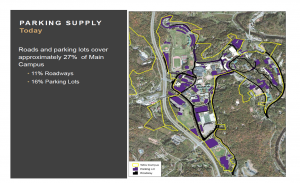Board of Trustee approved a five year plan to solve the campus parking issue, according to the information from the WCU Office of Public Relations. Starting in fall 2014, student parking permits will be sold on the basis of earned academic credits, with freshmen paying the highest rates while seniors and graduate students pay lower rates. Employee parking permits will be sold in a tiered system based on salary level, with the lowest paid employees paying the least for permits and those employees who have the highest salaries and who have reserved parking spaces paying the most.
The parking permits and fees are issued by WCU Parking Services an auxiliary entity to the University, that does not receive state funds. The state requires that Parking Services turn over 80% of their profit to the public school system, leaving them 20% to pay employees, maintenance and capital improvements.
The newly proposed WCU Master Plan has identified a need for at least 2,400 additional parking spaces, in addition to the 6,250 places available now, to accommodate the expected growth in the next ten years. The committee, who is a group of administrators, faculty, staff, and students, have identified a parking deck as the most effective solution to this problem. The mountainous terrain of WCU and the surrounding area does not support the space needed for traditional lots. The University needs to address this issue immediately by finding the financial resources.
There are three proposals that will each increase the price to park on campus for students in different ways. Student Government Association President Ryan Hermance discussed these options in a tuition increase forum in October.
One proposal was a flat fee increase across the board for all students. This route would have increased parking permit fees $52 per year, with students paying $304 to park by year 2017. Many students are unsure if they will be able to afford these flat fee increases.
“I don’t know what I’ll do if we end up having to pay over $200 just to have our cars at school. I can’t afford that. I would say I just won’t bring my car at all, but then I don’t know how I’d get home,” said sophomore Juliana Perez.
The second proposal was “convenience vs. costs”. This tiered system would have included prices ranging from $122 for bottom tier parking to $172 for top tier parking. The top tier parking will include the lots closest to the core of campus. There will also be a middle tier which includes lots on the perimeter of the core, and a bottom tier for lots on the perimeter of campus and freshmen parking.
Students on campus had different reactions to the tiered system proposal.
“I don’t like the idea at all. I think it only helps certain people on campus, the ones with money. I think that if there’s any designation on where people can park, it should be based off seniority,” said junior Seth Kilpatrick.
Not everybody agrees with Kilpatrick. Junior James Sinclair thinks it’s a good idea because it provides more options.
“If the price goes up for everyone, some people might not be able to afford it. The tiers let people with money have the opportunity to park closer and everyone else can at least bring their car to school,” said Sinclair.
The option that was approved is to increase the student permit by class. Freshman residents (students with less than 30 credit hours) will be required to pay a $76 increase per year. This will put them at $172 for 2014, $248 for 2015, and continuing to increase $76 every year after that. The same formula can be used for each class, except the increase for sophomores will be $64, for juniors it will be $52, and seniors will pay a $26 increase each year. Commuter students will pay an extra $64 per year regardless of their classification. This option is designed so that as students move through credit hours, they will pay less with seniority.
“I think this is the fairest option. I like the fact that we get rewarded as we go. Plus, as we get older, usually we take on more of the financial responsibility from our parents. Freshmen are still under their wing,” said senior Alex Abraham.
The faculty and staff also considered three proposals: a flat rate increase, convenience vs. cost, and variation by salary level. The last one was approved by the Board.
Vice Chancellor for administration and finance, Robert Edwards, said that he believes the plan for a parking garage will not only help accommodate the growth at Western, but also make WCU a safer and more pedestrian-friendly campus.
“Right now, roads and parking take up 27% of Western Carolina’s campus. People must walk through parking lots to get anywhere on campus, which isn’t always safe. It is the culture right now that we should be able to park right next to where we need to go, and that has to change,” Edwards told the audience at a parking forum in November.
“Due to the popularity of the permit by class proposal, this is the option we will take to the Board of Trustees for approval,” said Edwards earlier this week.
The WCU Board of Trustees approved the proposal on December 6 at their quarterly meeting. The changes that are decided on will be effective July 1, 2014.
For more information on the 2014 Parking Proposals, visit FAQ.



